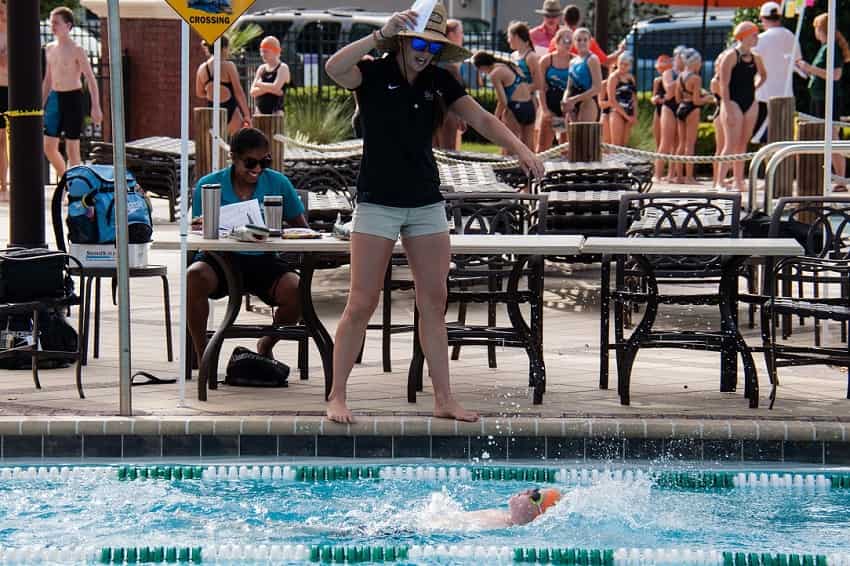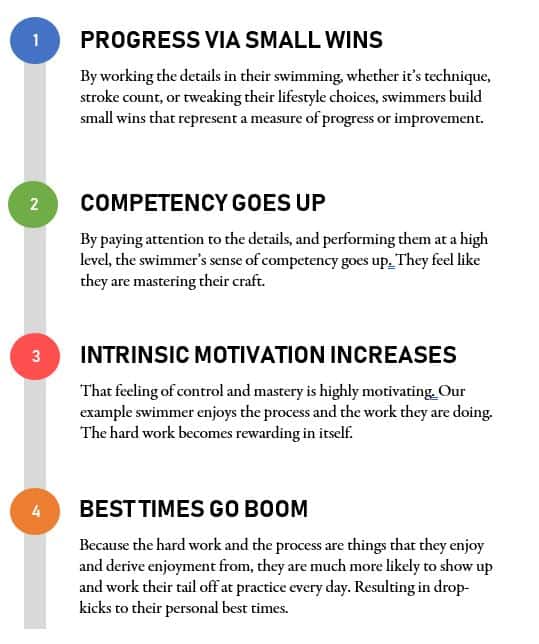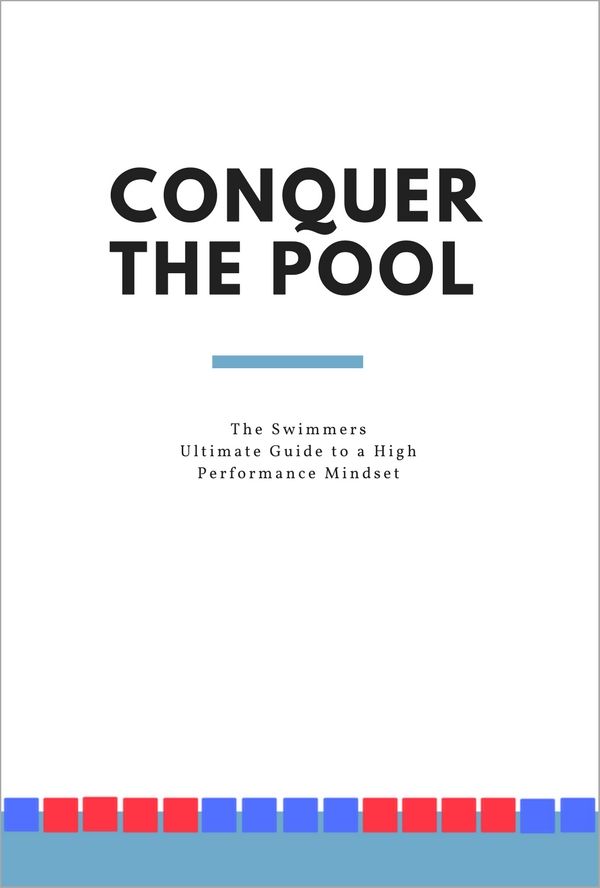Pep talks, watching the epic swims of past Olympians, and an endless barrage of motivational quotes can work in a pinch, but here are some long-term strategies that you can use to help truly motivate your swimmers.
Motivation.
We need it, we love it, and we are stoked when swimmers walk out onto the pool deck full of it.
Every coach’s dream scenario is to have every swimmer on the team rolling in to the pool with 25 mega-watts of motivation.
Of course, you know this isn’t realistic.
Even your most motivated athletes will have motivational lapses when they are injured, during exhausting stretches of workouts (heavy training sends our mood profiles crashing), or when they experience feeling stuck.
While ultimately it is on swimmers to decide to want to be there, there are some ways that you can create a climate and culture at the pool that brings up the motivational level of all the athletes on your squad.
Pitter patter, let’s get at ‘er!
1. Teamwork makes the motivation work.
Although swimmers tend to focus on their individual goals, cooperation and a feeling of togetherness can help boost intrinsic motivation.
One study of PE students found that when the participants worked in pairs or small groups to help one another reach common goals relatedness, intrinsic motivation and intention to do sport all went up.
There are lots of ways to help implement a sense of cooperation on the team. Some ideas include:
- Group bonding exercises
- Regularly doing peer coaching/mentoring
- Pairing up swimmers as accountability buddies
- Holding weekly team goal meetings
The upside on having a team that cooperates is all upside: you develop legendary team culture, the swimmers are more motivated to be there, and all that fun and cooperation translates into better training and performances.
2. Use extrinsic rewards to foster intrinsic motivation.
Swim coaches would love for their athletes to all be full to the brim with intrinsic motivation. That is, their swimmers all walk out onto the pool deck and work hard for the enjoyment and satisfaction that comes from leaving it all in the water on a daily basis.
High-performance swimmers, the Ledeckys, the Dressels, tend to enjoy the work and run on intrinsic motivation.
But extrinsic rewards, when done properly, can play a role in fostering intrinsic motivation.
Things like weekly awards for “Grinder of the Week”, a board with in-practice bests, and rewards for the swimmers who hit 100% attendance creates opportunities for recognition and tops up the intrinsic motivation of your swimmers.
The key with extrinsic rewards is that they foster a sense of competency or mastery.
Extrinsic rewards can quickly lose their effectiveness when the athlete feels as though they are being bribed or controlled.
When rewards don’t emphasize competency, they come across as being manipulative. The effect of this ends up being counter-productive to intrinsic motivation.
3. Progress is motivating.
When swimmers struggle at swim practice, or they aren’t improving as fast as they think they should be, or they have convinced themselves they have fallen butt-first into a plateau, you can almost see the motivation to work hard drain from their faces.
Progression and improvement are the most motivating things on the planet.
Seeing their hard work producing tangible results will keep them going through the hard main sets, the 60,000-meter weeks of training, and the never-ending haul of a season.
But how do you mark progression when they are under heavy training? Or when the big meet is still weeks or months off? How do you keep them on track and locked in when they are fatigued and exhausted and are ready to throw their kickboard across the pool deck in frustration?
Start by emphasizing and rewarding other markers of improvement.
Swimmers (and coaches, too) are obsessed with the clock. If our pace is off, or we are swimming slower than we usually do, a practice or set can feel like a waste of time. If we aren’t getting faster, what’s the point?
There are tons of other markers for improvement which signals competency, the foundation of intrinsic motivation.
Gamify the swimming of your athletes, particularly during those heavy stretches of training where the speed might not be there, with things like stroke counts, kicks off the wall, breath control work, and in-practice best times for kick/pull.
Progression isn’t measured solely by what the clock reads, although it’s the first thing we look at when we wanna see where things are at. There are an endless number of ways to mark progression and foster the motivation that comes along with it.
Progression signals competency, which kick-starts a super fun little cycle of improvement and motivation that develops elite swimming.
4. Emphasize process goals over outcome goals.
As a coach, you already know the power of emphasizing the process over the results. Swimmers who put their energy and focus on the day to day routine and process are less prone to the wild swings of inconsistent training, stress less about the things they don’t control, and are better prepared for race day.
When athletes are focused solely on the outcome, little disruptions in their training schedule take on a more serious note. A missed practice approaches apocalyptic levels of panic. When their competition throws down a monster time at a meet, the outcome-oriented swimmer tends to panic.
Focus on building a program that rewards the process. That takes pride and value in the swimmers who execute the best on a daily basis. Make becoming process-oriented a focal point of your team culture and daily training.
The process is where champions are made. It’s also where they tap into a nearly bottomless supply of intrinsic motivation.
University of Toronto coach Byron MacDonald, who coaches Olympic medalist and occasional world record holder Kylie Masse, notes that one of her biggest strengths is her ability to keep herself mentally dialed in on the process.
“A lot of people worry about the outcome and she just focuses on the process and likes to challenge herself,” says MacDonald.
How do you start realigning the mindset of your swimmers to a more process-based approach? Have them write out a sample daily process. The handful of things that they will focus on each day that will help launch them towards their goals.
5. Pair up swimmers of similar ability and let them race it out.
Competition is motivating. Researchers have consistently found that when we exercise next to someone or race against one of our rivals our motivation to perform well goes up.
This is one of the perks of having swimmers of the same age training for the same events—they are more likely to go at it in practice and produce a bigger effort than they would if swimming on their own.
When designing your swim workouts and athletes are picking their lanes, place an emphasis on swimmers of relatively the same speed swimming against each other. It will bring the compete level up and motivate swimmers to go a little faster.
The Goldilocks rule is in effect with this motivational strategy, however. Put a slow swimmer against a fast swimmer and more often than not the fast swimmer will ease of on her or his effort. Same thing with a slow swimmer racing a much faster swimmer.
Building a culture of motivation
Try out some of the tips above during your swim practices over the next few weeks.
Developing a positive team culture takes time, so don’t be discouraged if you aren’t seeing overnight results from your efforts.
The key takeaways:
- Put swimmers in pairs and small groups for peer coaching/mentoring and team building exercises
- Use extrinsic rewards strategically to kickstart intrinsic motivation
- Have markers of progression that aren’t based on the clock
- Emphasize a process-based approach to training and preparation
- Have swimmers of similar ability and speed race each other
 Want help coaching mental skills to your swimmers?
Want help coaching mental skills to your swimmers?
You spend a lot of time helping your swimmers improve their technique and conditioning. Why not also help them maximize what is happening between their ears when they are in the pool?
Conquer the Pool: The Swimmer’s Ultimate Guide for a High-Performance Mindset is a 300-page workbook that was written with one purpose in mind: to help swimmers develop legendary mindsets.
Whether it’s learning how best to focus while crushing the laps in practice, how to use self-talk to navigate “impossible” main sets, how to keep their head on straight on when injured, or the best mental and emotional state to be in on race day, Conquer the Pool will help your swimmers unlock their best performances.
Used and trusted by some of the top clubs and swimmers on the planet and written with the feedback of 200+ head coaches, Olympians, former world record holders and NCAA champions. We also do team orders for clubs, including a healthy team discount and custom branding.



 Want help coaching mental skills to your swimmers?
Want help coaching mental skills to your swimmers?











